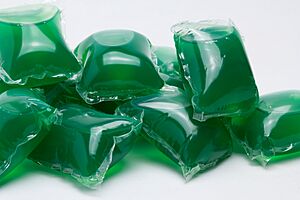Detergent facts for kids
A detergent is a special chemical substance that helps us clean things. You probably use detergents every day! Many people use washing powder, which is a type of detergent, to clean their clothes. Detergents are also used to wash dishes, clean floors, and even in some personal care products like shampoo. They work by helping water mix with oily dirt, so the dirt can be washed away.
Contents
What Are Detergents?
Detergents are cleaning agents that are different from traditional soap. While both soap and detergents help clean, detergents are made from different chemicals and often work better in hard water. Hard water has minerals that can make soap less effective, but detergents are designed to keep working well.
How Do Detergents Work?
Detergents are special because they are surfactants. This means they can reduce the surface tension of water. Imagine water as having a thin "skin" on its surface. Detergents break this skin, allowing water to spread out and soak into fabrics or surfaces more easily.
- Breaking Down Dirt: Dirt and grease are often oily and don't mix with water. Detergent molecules have two parts: one part loves water (hydrophilic) and the other part loves oil and grease (hydrophobic).
- Lifting Away Dirt: The oil-loving part of the detergent molecule attaches to the dirt and grease. The water-loving part then pulls the dirt away from the surface and into the water.
- Keeping Dirt Away: Once the dirt is in the water, detergent molecules surround it, preventing it from sticking back onto your clothes or dishes. This way, the dirt can be rinsed away with the water.
Different Kinds of Detergents
There are many different types of detergents, each designed for a specific cleaning job.
Laundry Detergents
These are the most common type of detergent. They come in many forms:
- Powder: A classic form, often used for general laundry.
- Liquid: Easy to measure and can be used for pre-treating stains.
- Pods or Packs: Small, pre-measured packets that dissolve in water, making laundry very convenient.
Laundry detergents often contain enzymes. Enzymes are special proteins that help break down tough stains like food, grass, or blood. They also have brighteners to make white clothes look whiter and colors look brighter.
Dishwashing Detergents
These detergents are made for cleaning dishes, glasses, and cutlery.
- Hand Dishwashing Detergents: These are liquids designed to create lots of suds and be gentle on your hands while effectively cutting through grease.
- Automatic Dishwasher Detergents: These come in powders, liquids, gels, or pods. They are designed to work in a dishwasher machine and produce very little foam, which is important for the machine to work correctly.
Other Uses of Detergents
Detergents are also found in many other cleaning products:
- All-purpose cleaners: For cleaning floors, counters, and other surfaces around the house.
- Shampoos and body washes: Many personal care products use mild detergents to clean hair and skin.
- Industrial cleaners: Stronger detergents are used in factories and businesses for heavy-duty cleaning.
The History of Detergents
Before detergents, people mostly used soap for cleaning. Soap has been around for thousands of years. However, during World War I and World War II, there was a shortage of fats and oils needed to make soap. Scientists began to develop synthetic (man-made) detergents as an alternative.
The first synthetic detergents became widely available in the 1930s and 1940s. These new detergents quickly became popular because they worked better in hard water and could clean a wider range of materials. Over time, detergents have become more advanced, with new ingredients added to make them even more effective and environmentally friendly.
Related pages
See also
 In Spanish: Detergente para niños
In Spanish: Detergente para niños
Images for kids
 | Madam C. J. Walker |
 | Janet Emerson Bashen |
 | Annie Turnbo Malone |
 | Maggie L. Walker |



